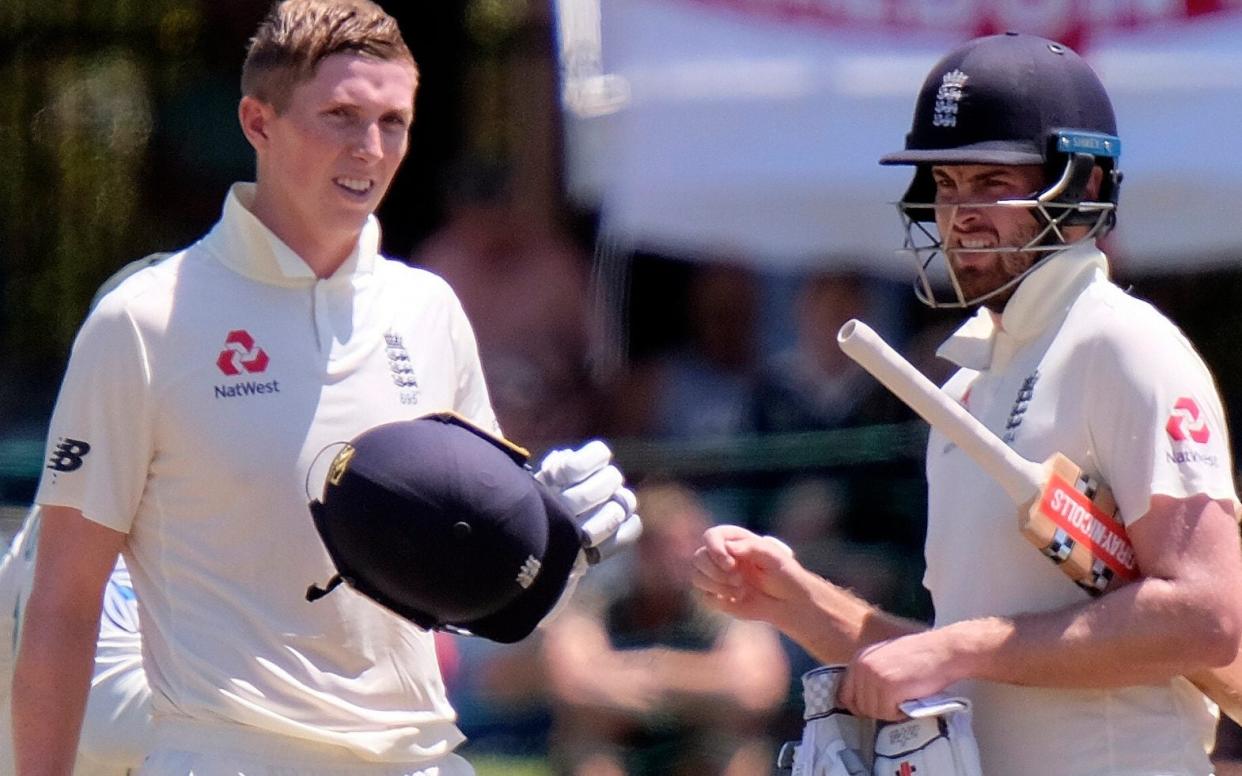Zak Crawley and Dominic Sibley make promising start with England's biggest opening partnership since 2009

Joe Root stood up and applauded his two young openers off the field at lunchtime after England had negotiated the opening session of a Test match without losing a wicket for the first time in three years.
Dominic Sibley and Zak Crawley would go on to bat together for 181 balls compiling England’s longest first innings opening partnership since 2009, which says a lot about their determined performance and the problem of finding a partnership as reliable as Andrew Strauss and Alastair Cook.
Sibley followed his maiden Test century in Cape Town with 36 and Crawley made his highest Test score of 44 to give England a solid start but both gave their wickets away in the afternoon session, surrendering the chance to play the big innings that would be so important at the start of their careers. This pitch is low, and slow, as if transported from Asia, the best place in the world to be an opener. The new ball did nothing and South Africa were flat after defeat in Cape Town. Both let the opportunity slip out of their grasp as they were out-thought by South Africa after lunch.
Rory Burns must have been sat at home on his sofa resting his damaged left ankle and been filled with a lifetime’s worth of envy when he saw the surface and South Africa opening the bowling with a 30-year-old debutant rather than Kagiso Rabada, one of the world’s best. When Quinton de Kock stood up to the stumps for Vernon Philander in the seventh over of the Test, Burns must have been throwing his crutch at the television.
Quite why Faf du Plessis opened up with Dane Paterson is a question he will face at the end of the Test. Perhaps he thought it would ease Paterson’s nerves if he did not have to stand around in the field stewing over when he would bowl in Test cricket for the first time after years on the South African domestic scene waiting for his chance. Du Plessis perhaps hoped as a swing bowler he would threaten the edge more than Rabada but Paterson was nervy and bowled too short, perhaps fearing being driven on debut.

Rabada averages 17 at this ground and even though it was not a pitch conducive for bouncers whizzing past nostrils, the short ball is a problem for both openers. Sibley is tall and not very mobile. He is cramped for space. Crawley plays the modern way, pulling and hooking off the front foot so the ball goes up rather than down. Fine in county cricket but dangerous in Test cricket especially in Australia where 90mph bumpers await.
When Rabada came on in the ninth over he drew the first false shot with Crawley spooning a pull in the air but the ball just evaded Anrich Nortje at mid on.
There is no doubting the temperament of both openers. Neither looks overawed by Test cricket and appear to be comfortable with their own games. That bodes well for both.
Sibley has worked on his off side play and peeled off two nice boundaries through extra cover. He looked relaxed, boosted by his century in Cape Town. England insiders say he has not stopped smiling since and it shows how confidence can make a player forget his weakness. He scored 26 of his 36 through the off side having previously looked strokeless outside off stump.
At 60-0 at lunch, England had enjoyed a good session. The openers had ticked along nicely and left the ball well. But their deficiencies were shown up by a South African side revitalised by a lunchtime tactical team talk. South African bowled wicket to wicket with Rabada mixing in the short balls to a 6-3 leg side field.
Du Plessis stationed a catcher behind square on the leg side, and both openers fell in the trap. Crawley said he had never before batted against a 6-3 leg side field and both were scrambled by the tactic. Sibley clipped to leg gully and Crawley to backward square leg. Once again England batsmen had made a start and let it go. It is how, or if, they learn from that mistake that will shape their careers.

 Yahoo News
Yahoo News 
